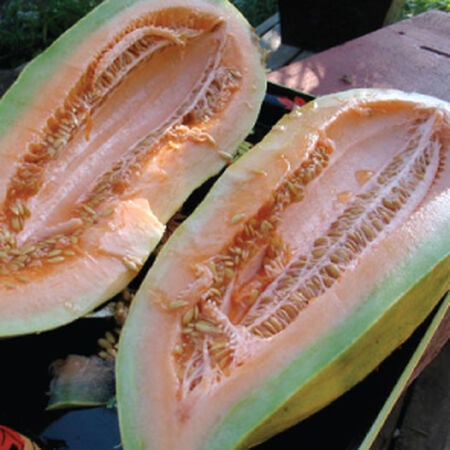Banana, Melon Seeds
Key Attributes
Key Attributes
Product Details
Weight
0.008Depth
0.15Height
4.5Width
3.25Plant Height
12-18"Botanical Name
Cucumis meloSeed Type
SeedSeeds Per Gram
32Seeds Per Pound
14,400Row Spacing
6'Packet
30 SeedsSow Depth
1/2"Seeds Per Ounce
900Breed
Open-pollinatedSun
Full SunTypes
CANTALOUPE (MUSKMELON)Maturity
Late SeasonFruit Weight
5-7 lbsLife Cycle
AnnualSow Method
Direct SowPlant Spacing
18"Categories
MelonGermination
5,6,7,8,9,10Days To Maturity (# Days)
90Heirloom
HeirloomSeeds Per Acre
1.1 lbsComponents
Growing Instructions
![]() Learning Download: How to Grow Melons
Learning Download: How to Grow Melons
Melons provide a sweet and colorful addition to summer meals, and they can be grown in the home garden. In addition to the typical cantaloupe and honeydew melons, gardeners can grow other varieties such as banana melons.
Before Planting: A light, well-drained soil with a pH of 7.0 and a southern exposure is ideal. Good soil moisture is important in early stages of growth and during pollination when fruits are setting.
Planting: For direct seeding, sow 1-2 weeks after last frost when soil is warm, above 70°F, 3 seeds every 18″, 1/2″ deep, thinning to 1 plant/spot. Space rows 6′ apart. For transplanting, sow indoors in 3 weeks before last frost and transplanting outside. Plant 2-3 seeds per or pot, about 1/4″ deep. Keep temperature 80-90°F until germination. Handle young plants carefully and never let the soil dry out. Grow seedlings at 75°F. Reduce water and temperature for a week to harden seedlings. When the weather is frost-free, warm, and settled, transplant 2-3′ apart in rows 6′ apart or thin to 1 plant/pot or cell with scissors and transplant 18″ apart. Even hardened melon seedlings are tender. Do not disturb roots when transplanting, and water thoroughly.
Watering: Melons need a steady supply of water, and soil needs to be damped but not flooded, approximately 1 inch a week.
Fertilizer: Prior to planting, mix aged manure and compost into the soil. Melons are heavy feeders, so fertilize at planting and throughout the growing season with a 5-5-5 or 10-10-10 granular fertilizer. Do not let the granules come in contact with the plant.
Days to Maturity: A ripe melon should be very easy to remove from the vine. For a cantaloupe, the netting pattern on the melon becomes more visible and a crack appears at the base of the stem when it was ripe. For a honeydew, the color becomes creamy. Most melon varieties are ready for harvest when the gray-green color begins to change to pale yellow and when a light tug separates the fruit from the vine. Some melon types, like honeydew, Charentais, canary, Spanish, and Crenshaw are overripe by the time the stem can be tugged from the fruit. (See each variety for days to maturity)
Harvesting: Melons must be cut from the vine. All melons should be stored at 90% relative humidity. Store ripe melons at 40-45°F for 7-14 days.
Tips: Cut off watering 1 week before harvest. This will give a more flavorful, concentrated melon. Over watering before harvest can cause bland taste.
AVG. Direct Seeding Rate: 30 seeds/10′, 100 seeds/50′ 1M/500′, 15M/acre at 3 seeds every 18″ in rows 6′ apart.
Shipping Schedule
Our Seed Promise
 "Agriculture and seeds" provide the basis upon which our lives depend. We must protect this foundation as a safe and genetically stable source for future generations. For the benefit of all farmers, gardeners and consumers who want an alternative, we pledge that we do not knowingly buy or sell genetically engineered seeds or plants.
"Agriculture and seeds" provide the basis upon which our lives depend. We must protect this foundation as a safe and genetically stable source for future generations. For the benefit of all farmers, gardeners and consumers who want an alternative, we pledge that we do not knowingly buy or sell genetically engineered seeds or plants.
The mechanical transfer of genetic material outside of natural reproductive methods and between genera, families or kingdoms, poses great biological risks as well as economic, political, and cultural threats. We feel that genetically engineered varieties have been insufficiently tested prior to public release. More research and testing is necessary to further assess the potential risks of genetically engineered seeds. Further, we wish to support agricultural progress that leads to healthier soils, to genetically diverse agricultural ecosystems, and ultimately to healthy people and communities.
To learn more about the "Safe Seed Pledge" please visit www.councilforresponsiblegenetics.org.

